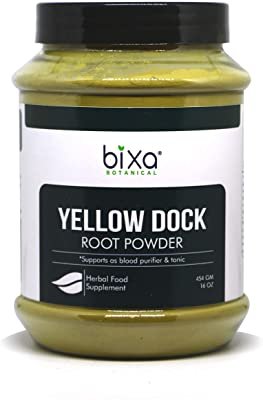Yellow Dock
Natural Remedy for Enhancing Liver Function and Aiding Digestion
Yellow Dock is a perennial herb native to Europe and western Asia, and it is widely distributed in North America. The plant has been used for centuries in traditional medicine for its various health benefits. Here's a guide to using Yellow Dock as a natural remedy and herbal:
What is Yellow Dock?
Yellow Dock (Rumex crispus) is a perennial herb native to Europe and Western Asia but has since become widespread in North America. It belongs to the Polygonaceae family and is characterized by its long, wavy-edged leaves and reddish-brown, clustered flowers that turn into seeds. Yellow Dock has been used for centuries in traditional medicine for its various health benefits, particularly related to digestion, skin conditions, and detoxification.
Health Benefits of Yellow Dock
Yellow dock has a variety of health benefits, including:
Blood Cleanser
Yellow dock has been traditionally used as a blood cleanser and liver tonic, which helps detoxify the body and improve liver function.
Digestive Health
Yellow dock has been used to relieve constipation, diarrhea, and other digestive problems. It helps to stimulate digestive juices and promote bowel movements.
Skin Health
Yellow dock has anti-inflammatory and antibacterial properties that help to relieve skin conditions such as acne, eczema, and psoriasis.
Anemia
Yellow dock is rich in iron, which makes it beneficial for treating anemia.
Uses of Yellow Dock
Yellow dock can be used in various ways, including:
Tea
Yellow dock tea is a popular herb consumption. Simply steep dried yellow dock roots or leaves in hot water for 10-15 minutes.
Tincture
Yellow dock tincture can be made by steeping the herb in alcohol for several weeks. This can be used to help relieve digestive issues and promote liver function.
Topical Applications
Yellow dock can be applied topically to the skin to help alleviate skin conditions.
Historical Uses of Yellow Dock
Yellow dock has a long history of use in traditional medicine. Native Americans used yellow dock to treat skin conditions, while European herbalists used it to treat digestive problems and liver disorders. The medicinal properties of Yellow Dock are attributed to its bioactive compounds, such as anthraquinones, tannins, and various minerals like iron, which give the plant its laxative, astringent, and anti-inflammatory properties.
Historical uses of Yellow Dock include:
Digestive Health
Yellow Dock has been used in traditional medicine to address digestive issues such as constipation, bloating, and indigestion due to its laxative and astringent properties.
Skin Conditions
Yellow Dock has been applied topically to treat skin issues such as eczema, psoriasis, and rashes due to its anti-inflammatory and astringent properties.
Blood Purification and Detoxification
Yellow Dock has been used to promote detoxification by stimulating liver and kidney function, aiding in the elimination of toxins from the body.
Anemia Support
Yellow Dock has been used as a source of iron, helping to alleviate symptoms of anemia and improve overall energy levels.
Respiratory Health
Yellow Dock has been used to treat respiratory ailments such as coughs and bronchitis by helping to soothe irritated mucous membranes and reduce inflammation.
Scientific Studies on Yellow Dock
While more research is needed, some studies have shown promising results for the health benefits of yellow dock. One study found that yellow dock extract helped to reduce inflammation in the liver, while another study found that it had antibacterial properties against several types of bacteria.
Growing Yellow Dock
To grow Yellow Dock, sow seeds outdoors in spring or early summer, or start them indoors in late winter and transplant after the last frost. The plant prefers well-draining soil with a pH of 5.5 to 6.5, and a location with full sun to partial shade. Water regularly during the first growing season, and as needed thereafter. Harvest leaves in spring or early summer, and roots in the fall.
When foraging for Yellow Dock, look for its distinctive wavy-edged leaves and reddish-brown clustered flowers in moist areas such as meadows, fields, and roadsides. Practice sustainable harvesting by taking only what you need and leaving enough plants for future growth.
Precautions and Side Effects
Yellow dock may interact with certain medications, including blood-thinning medications and medications for high blood pressure. It should not be used by pregnant or breastfeeding women. Yellow Dock should be used with caution, as excessive consumption can lead to gastrointestinal issues and may interfere with the absorption of certain medications.
Conclusion
In conclusion, Yellow Dock is a versatile herb with a rich history in traditional medicine, providing various health benefits that include digestive health, skin condition relief, detoxification, anemia support, and respiratory health improvement. While its historical uses highlight its potential as a natural remedy, it is important to remember that more scientific research is needed to fully understand its efficacy and establish optimal dosages and applications. By exercising caution and following expert guidance, Yellow Dock can be a valuable addition to one's natural health regimen.
Ready to learn more?
Check out the herbal academy to become a herbal expert!
Are you ready to get growing? Grab the Medicinal Garden Kit here to get started!





